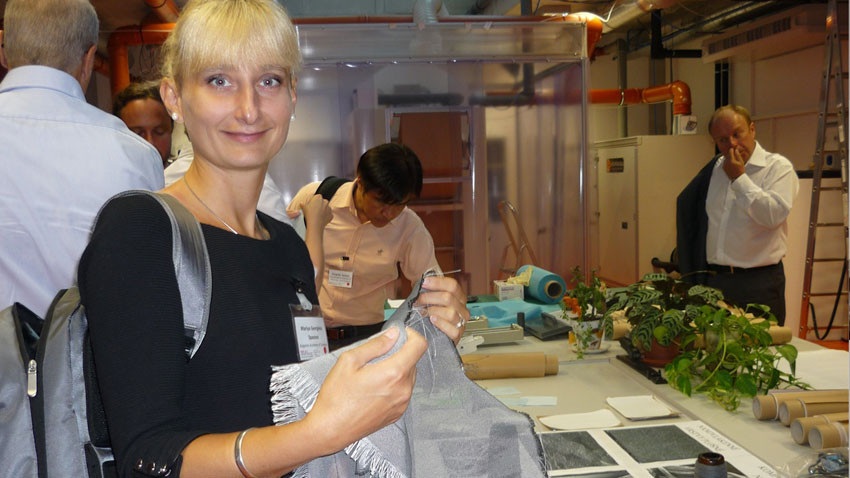Antimony, the 51st chemical element on the periodic table, will, from now on, be connected with the name of the young Bulgarian scientist Maria Spasova, because her name is now on the Periodic Table of Younger Chemists of the International Union of Pure and Applied Chemistry (IUPAC) – under number 51.
A total of 118 scientists of the future from all over the world will find a place on the period table, to mark the organization’s centenary in 2019, the international year of the periodic table.
Maria Spasova earned the IUPAC’s recognition for her achievements in the design and construction of biocompatible and biodegradable polymers and composite materials for biomedical application, and use in agriculture and superhydrophobic clothing. She has already taken her place on the period table, to which the names of young scientists will be added until mid-2019. The young Bulgarian researcher works at the Bulgarian Academy of Sciences’ Institute of Polymers, where she constructed a nanofiber device for use in medicine, including in the treatment of cancer.
“Our work involves synthesis, characterization and design of biocompatible polymers, and we apply different modern techniques to construct them,” says Assoc. Professor Dr. Maria Spasova about her work at the institute. “One of these techniques is electrospinning – a cutting edge nanotechnology for obtaining nanofibers and nanoparticles for potential application in medicine, pharmaceuticals, fiber and cell engineering, for making censors, filters, military protective clothing.”
This technique helped Maria Spasova’s laboratory create a new material based on chitosan, used as wound dressing material.
“Placed on the wound, this material stops bleeding, and if it is an open wound, it checks the development of bacteria, leaving the wound to breathe,” Maria Spasova says. “Many of the polymer materials obtained by electrospinning can include various kinds of synthetic or natural medication, or anticancer medicine. That is a way to improve their therapeutic effect and prevent side effects.”
Another one of Maria Spasova’s accomplishments is applicable in agriculture, where, with the help of this avant-garde technology, plants can be protected from pests but also from the detrimental effect of the environment. Replicating the structure of the lotus leaf is the key to the fabric for military clothing. The fabric is impermeable, and the water drops roll off it when the surface is at a slant, it is also self-cleaning. This invention is applicable in our everyday lives, and is now available in superhydrophobic material and nanoparticle-based sprays.
Being on the Periodic Table of Younger Chemists is the latest in a string of achievements for Maria Spasova. In 2008 Dr. Maria Spasova’s PhD-thesis was distinguished as one of the six best theses in the world for the period 2007-2009 in the Quadrant Award Event, held at the Swiss Federal Institute of Technology in Zurich, Switzerland. She was invited to present her thesis there personally, and, subsequently, had five scientific papers, based on her thesis, published in prestigious scientific journals. And though soon after that she earned a specialization scholarship from the Belgian government and could have stayed on in Belgium, Maria Spasova decided she would upgrade her knowledge there, but would then return to Bulgaria to continue her scientific work.
“Conditions in Bulgaria are different financially, as well as in terms of equipment and facilities” Maria Spasova says and adds that she does not regard herself as a lucky exception among her coworkers. “Though, on the whole, Bulgarian chemists have an admirable place in the international rankings, because a researcher is judged by his or her scientometric performance. So, we are publishing and patenting our work, we have many citations, we are very well positioned and are recognizable.”
The name of the Bulgarian scientist will not be on the period table for ever, but as Maria Spasova says, it is a symbol that will be news that can be seen and read 100 years from now.
English version: Milena Daynova
Photos courtesy of Maria Spasova
Bulgarian scientists in Antarctica traditionally celebrate the New Year several times, depending on the presence of foreigners in the base, the head of the Bulgarian Antarctic Expedition, Prof. Dr Christo Pimpirev, told BNR Burgas. One of the..
Bulgarians' assessments of the past year in personal terms differ sharply from their views on the situation in the country and the world , according to a nationally representative survey conducted by polling agency Alpha Research between December 1 and..
For the fifth consecutive year, the Sketches of Sofia initiative have delighted Sofia's residents with gifts placed at the city's statues . Every year, photographer Ivan Shishiev and his wife buy books for Sofia residents, wrap them up and place them at..
The year 2024 was marked by political instability and confrontation - not so much over ideas for solving Bulgaria's long-standing governance puzzle, but..

+359 2 9336 661
